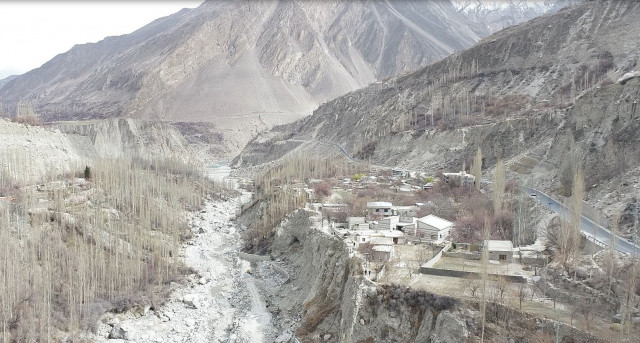Taus Bibi, 70, was tending to her goats in Sherabad, an area in Hassanabad, Hunza, when she heard a loud sound of something crashing into the nearby water channel. One of her grandchildren followed shortly, running and asking her to evacuate to a safe area as a flood was dangerously close to their home. Taus had no choice but to run to a nearby orchard where she and other people displaced by the flood spent over 35 hours.
Hassanabad also had one of the major power stations for the district of Hunza, which was also wiped out, depriving the villagers of electricity for many days. Such floods, resulting from glacial lake outbursts have been hitting the village of Hassanabad, (which includes Sherabad, Harum, Roshanabad and main Hassanabad) since 2010. Out of all the surging glaciers in the Karakorum Range, the Shisper Glacier is 12 kms long and has been impacting the most lives in the Hassanabad region.
Melted glacier water can form ice walls, which end up creating reservoirs for the rest of the melted ice. Glacial lake outburst floods (GLOF) occur when these ice walls fail, unleashing entire lakes on nearby villages and roads. There are at least 7,000 glaciers in Gilgit Baltistan out of which 3,044 have formed glacial lakes while 33 are at the risk of outburst flooding. Such floods, if not mitigated, threaten at least seven million people in both Gilgit Baltistan and Khyber Pakhtunkhwa.
In March 2017, in order to prevent large scale flooding, a project was started to scale up the lakes that were at the risk of bursting. The Ministry of Climate Change has been leading the project along with the support of the United Nations Development Program (UNDP) and funding from the Green Climate Fund. The Scaling-up of GLOF risk reduction in Northern Pakistan (GLOF-II) project is a part of ‘Reducing Risks and Vulnerabilities from GLOF in Northern Pakistan’, also known as GLOF I.
The Shisper Glacier is melting again with the advent of summer in Pakistan and despite the efforts by GLOF I, at least 21 households in Hassanabad have been deemed at risk and families have been asked to evacuate to safer locations while the Gilgit Baltistan administration has declared a state of emergency in the surrounding areas. Teams from both GLOF and the Pakistan Meteorological Department are keeping a close eye on the lake using ground penetrating radars and Differential GPS. Water levels are also being monitored. An automatic weather station has also been installed in Shisper to monitor the weather in real time.
Community Based Disaster Risk Management Committees (CBDRMC) have been formed by training locals in disaster risk reduction, they have also undergone mock drills while being trained in disaster preparedness.
It has been decided that the Gilgit Baltistan Disaster Management Authority (GBDMA) in collaboration with GLOF II will build gabion walls to protect the population in case of a flood, while irrigation channels are also on the cards along with building of shelters, where people may run to in case there is a disaster.
Emergency response equipment has also been handed out to the locals, which include generators, UPS batteries, inverters, binoculars, walkie talkies, GPS, gas cylinders, portal generators, cyber shot cameras, range finders and small solar panels.
Despite these measures, the locals stay fearful, as disaster management is not as good as living disaster free. They are waiting for permanent solutions, such as migration options to safer places that are not in the path of GLOFs, however, with the very real threat of climate change, it is only a matter of time before we have a lot more than just one village and glacier to think about.



COMMENTS
Comments are moderated and generally will be posted if they are on-topic and not abusive.
For more information, please see our Comments FAQ